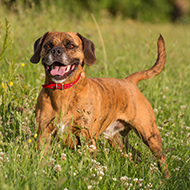Clarity in dog profiles key to rehoming success, study finds

Research found that potential adopters preferred clean and honest profiles, to get a better picture of the dogs' potential.
New research from Scotland's Rural College (SRUC) has found that the content of description profiles could improve the long-term success of dog adoptions.
Lucie Monie, Masters student at SRUC, explored how potential dog owners use description profiles of adoptable dogs in their decision making, in order to improve these, and increase the number of successful adoptions.
Dr Morag Heirs, of the University of Edinburgh and Well Connected Canine, is overseeing the project alongside Dr Laura Dixon, research fellow at SRUC.
Dr Heirs explained: “For many rehoming centres, each available dog is promoted via a picture or two plus a brief profile.
“Understanding how potential adopters might understand these summaries can assist in increasing the transparency of the descriptions, and help adopters form more realistic expectations of their new family member and their ability to cope.”
Using an open questionnaire and interviews with people, each with a varying amount of previous dog ownership and adoption experience, the study found that potential owners put a significant amount of effort into interpreting the terminology used in a dog's description in order to judge their 'adoptability'.
The study found that potential adopters preferred honest and clear descriptions of the dog's behaviour, such as using the word reactive instead of saying that it 'doesn't get on with other dogs'.
In profiles with unclear terminology, potential adopters found that the profiles didn't properly represent the dogs' future potential. It was also found that unclear information had an impact on the potential adopters' confidence in their ability to cope with a dog.
Lucy Monie, who undertook the research, said: “This is a starting point in this area of research that may assist rescue organisations in writing their description profiles to increase the number of people rehoming and ensure a greater number of adoptions are successful - particularly those dogs with perceived challenging behaviours which are more difficult to rehome.
“Reducing the number of dogs staying longer than necessary in rescue organisations would also provide wider welfare benefits, enabling more dogs to enter and be rehomed.”
Importantly, profiles considered to be more effective and useful were those which featured suggestions and information on how to manage the dog, such as the need for a garden or secure space.



 The Veterinary Medicines Directorate (VMD) is inviting applications from veterinary students to attend a one-week extramural studies (EMS) placement in July 2026.
The Veterinary Medicines Directorate (VMD) is inviting applications from veterinary students to attend a one-week extramural studies (EMS) placement in July 2026.